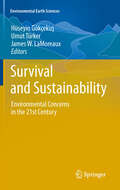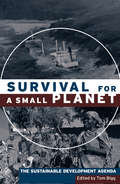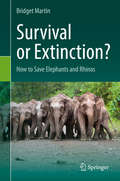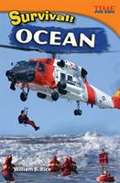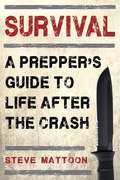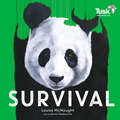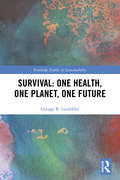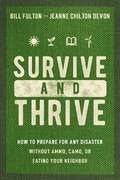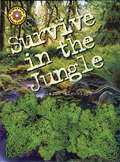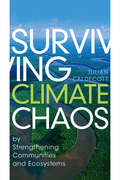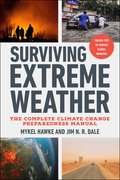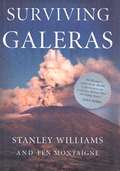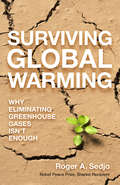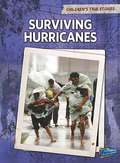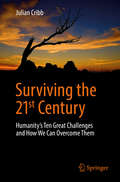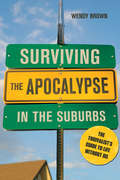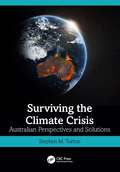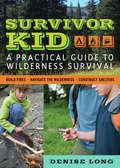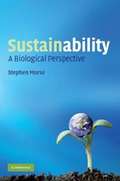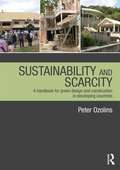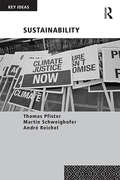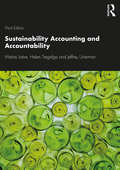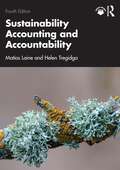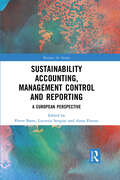- Table View
- List View
Survival and Sustainability
by James W. Lamoreaux Umut Türker Hüseyin GökçekusThe International Conference on Environment: Survival and Sustainability, held at the Near East University, Nicosia, Northern Cyprus 19-24 February 2007, dealt with environmental threats and proposed solutions at all scales. The 21 themes addressed by the conference fell into four broad categories; Threats to Survival and Sustainability; Technological Advances towards Survival and Sustainability; Activities and Tools for Social Change; Defining Goals for Sustainable Societies. Activities and tools that move the society towards greater sustainability were emphasized at the conference. These included environmental law and ethics, environmental knowledge, technology and information systems, media, environmental awareness, education and lifelong learning, the use of literature for environmental awareness, the green factor in politics, international relations and environmental organizations. The breadth of the issues addressed at the conference made clear the need for greatly increased interdisciplinary and international collaboration the survival and sustainability concept. The exchanges at the conference represent a step in this direction.
Survival for a Small Planet: The Sustainable Development Agenda
by Tom BiggFew scientific developments have given rise to as much controversy as biotechnology. Numerous groups are united in their opposition, expressing concern over environmental and health risks, impacts on rural livelihoods, the economic dominance of multinational companies and the ethical implications of crossing species boundaries. Among the supporters of the technology are those that believe in its potential to enhance food security, further economic development, increase productivity and reduce environmental pressures. As a result, countries - and sectors within countries - find themselves at odds with each other while potential opportunities for development offered by the use of biotechnology are seized or missed, and related risks go unmanaged. This book, a unique interdisciplinary collection of perspectives from the developing world, examines the ongoing debate. Writing for the International Centre for Trade and Sustainable Development, leading experts address issues such as diffusion of technology, intellectual property rights, the Cartagena Protocol, impacts of international trade, capacity building and biotechnology research and regulation. With the most recent and relevant examples from around the world, Trading in Genes offers the reader a single-volume overview of the connections between biotechnology, trade and sustainability that is both wide-ranging and thorough.
Survival or Extinction?: How to Save Elephants and Rhinos
by Bridget MartinWritten with passion for anyone interested in seeing an end to the illegal trade in elephant ivory and rhino horn, this book shows how, by working together, people all over the world who care about these animals are gradually bringing about change for the better. It takes an overview of how the current situation came to pass by exploring poaching and its devastating consequences and the pivotal role of organized crime. The discussion of how matters are starting to improve covers the investigation and monitoring of ivory markets, sustainable uses and the key role of local communities.Enforcement of the law is vital in this story. Enter the enforcers, the technology they use to defeat the poachers and the evidence they require to prosecute offenders. Cases, some deeply shocking, are included, as well as a number of fascinating case studies, while the exploits of organized crime gangs make lively, as well as disturbing reading. Throughout the message is clear. We can and must save these animals from extinction.
Survival!: Ocean (Time For Kids Informational Text Series)
by William B. RiceWhat do you do if you find yourself stranded at sea? This useful nonfiction book gives readers the information they need in order to survive at sea. With essential tips and instructions, helpful diagrams and images, a bibliography, and a list of other useful websites, readers will learn everything they need in order to survive--from the dangers of hypothermia, what to do if there's only saltwater available, and other useful survival skills.
Survival: A Prepper?s Guide to Life after the Crash
by Steve MattoonDefend what’s yours when catastrophe strikes with expert tips that go beyond food and water storage.Should a national disaster occur, how will you respond? What will occur when critical societal services cease to function? As a prepper, you will likely be ready to hole up and live off of your stored supplies, at least for a while. But what do you do during that time? What are your next steps? And how do you defend yourself against others who have not prepared for such a disaster?After the Crash covers all the situations that you may face when the lack of governmental infrastructure leads to social upheaval and chaos. Since most of the population is unprepared for a disaster of any kind, this book gives both the trained and untrained prepper valuable information needed to have any chance of survival in a world where organized government assistance may not be available. Importantly, he details the crucial steps you need to take in addition to doing everything other survival manuals advise. These critical tips go beyond stockpiling food, water, and weapons.Offering battle-proven advice, Steve Mattoon explores what it takes to survive alone versus in groups, each approach presenting its own advantages and challenges. Discover how best to defend yourself, what to use, and how to most effectively use the tools you have at your disposal. Whether you find yourself in a rural area or an urban jungle, Steve Mattoon’s After the Crash will prove an essential addition to any prepper’s bug-out bag.
Survival: Are You Tough Enough? (White Wolves Non Fiction)
by Anna Claybourne Louise McNaughtFrom the rainforest to the savannah to the depths of the ocean, animal life in every continent and habitat has been affected by human activity. Louise McNaught's powerful animal portraits bring to life 20 stunning creatures and their fight for survival. Discover the dangers they face, the action being taken to protect them, and their vital importance on Earth.Be inspired to join the movement to conserve species and find out how you can make a difference.
Survival: One Health, One Planet, One Future (Routledge Studies in Sustainability)
by George R. LueddekePlanet Earth has been here for over 4.5 billion years but in just two human generations we have managed to place our only 'home' at great risk. Many lessons from history have not yet been learned and new lessons may prove equally, if not more, difficult to take on board as we head deeper into the twenty-first century. This book highlights two of our greatest social problems: changing the way we relate to the planet and to one another, and confronting how we use technology (dataism) for the benefit of both humankind and the planet. Covering a wide range of key topics, including environmental degradation, modern life, capitalism, robotics, financing of war (vs peace) and the pressing need to re-orient society towards a sustainable future, the book contends that lifelong learning for sustainability is key to our survival. The author argues that One Health - recognising the fundamental interconnections between people, animals, plants, the environment - needs to inform the UN-2030 Sustainable Development Goals and that working towards the adoption of a new mindset is essential. We need to replace our current view of limitless resources, exploitation, competition and conflict with one that respects the sanctity of life and strives towards well-being for all, shared prosperity and social stability. Clearly written, evidence based and transdisciplinary - and including contributions from the World Bank, InterAction Council, Chatham House, UNESCO, World Economic Forum, the Tripartite One Health collaboration (UN Food and Agriculture Organization, World Organisation for Animal Health and World Health Organization), One Health Commission and more - this book cuts across sociopolitical, economic and environmental lines. It will be of great interest to practitioners, academics, policy-makers, students, nongovernment agencies and the public at large in both developed and developing nations.
Survive and Thrive: How to Prepare for Any Disaster Without Ammo, Camo, or Eating Your Neighbor
by Jeanne Devon Bill FultonGet ready for a refreshing and unique take on preparedness. This essential guide is for regular people who want to handle disaster situations confidently, without digging a network of underground bunkers stockpiled with weaponry.From the really loud wake-up call of the COVID-19 pandemic to the escalating climate crisis, the world is becoming increasingly unpredictable. It&’s time to buckle up—but fear not! Army vet and sustainable organic farmer Bill Fulton and Alaska adventurer and writer Jeanne Chilton Devon will demystify the whole notion of "prepping" and make it accessible and practical for everyone.In this comprehensive handbook, you'll learn essential knowledge like water sourcing and purification, long-term food storage, stocking a disaster pantry, creating a safe home, assembling evacuation bags, and ensuring your family doesn't drive each other crazy in the face of chaos. You'll also unlock cool survival hacks to save the day when the lights are out, the gas is off, the supermarket is closed, and everyone around you is hunkered down like a mountain hermit.Unlike other prepping guides, Survive and Thrive recognizes that what we need is a collaborative, sustainable, and family-friendly approach to preparedness. Say goodbye to doomsday paranoia and learn empowering information to help you live better now and have a solid plan for whatever comes tomorrow. SPOILER: That's how we all make it through the 21st century!With an upbeat attitude, detailed instructions, how-tos, checklists galore, and even historical survival recipes, city dwellers and suburbanites alike will get organized and on the path to sustainability and resilience—whatever may come!
Survive in the Jungle
by Claire LlewellynDo you have what it takes to survive in the jungle? Can you build a shelter, find food that's safe to eat, handle extreme humidity, and treat a poisonous snakebite? Imagine that you are lost in the jungle with only a few useful items--how would you survive until you are rescued? This book explores all aspects of enduring life in the jungle. Read through all 12 exciting challenges and learn how to endure extreme conditions. You can even try some of the ideas at home! When you master these challenges, put your knowledge to the test by taking a quiz to see if you are a true survivor! This entertaining book tests children's ability to survive in the jungle with 12 tasks ranging from building a shelter and finding food and water to how to treat a snakebite and fend off nasty bugs. Each page features color photographs to make this a realistic adventure, as well as a question-and-answer section, important tips, at-home activities, and a set of survival tools to stimulate children's skill and reasoning power and inspire them to trust their judgment. The cover featuring a plastic water bug and snake add to the fun. For 8 to 12-year-olds.
Surviving Climate Chaos: by Strengthening Communities and Ecosystems
by Julian CaldecottSurviving climate chaos needs communities and ecosystems able to cope with near-random impacts. Their strength depends upon their integrity, so preserving and restoring this is essential. Total climate breakdown might be postponed by extreme efforts to conserve carbon and recapture pollutants, but climate chaos everywhere is now inevitable. Adaptation efforts by Paris Agreement countries are converging on community-based and ecosystem-based strategies, and case studies in Bolivia, Nepal and Tanzania confirm that these are the best ways forward. But success depends on local empowerment through forums, ecosystem tenure security and environmental education. When replicated, networked and shielded by governments, they can strengthen societies against climate chaos while achieving sustainable development. These vital messages are highlighted for all those who seek or have already found a role in promoting adaptation: for students, researchers and teachers, government officials and aid professionals, and for everyone who is now living under threat of climate chaos.
Surviving Extreme Weather: The Complete Climate Change Preparedness Manual
by Mykel Hawke Jim N.R. DaleThe only guide you need to prepare for the dangerous effects of climate change. The world has changed, and impacts of global warming means weather events like extreme heat, wildfires, hurricanes, and droughts are now being felt by all of us. We can ignore climate change no longer and must prepare ourselves to survive in new conditions. The key to surviving extreme weather events is to understand them from a practical perspective and then plan and execute tactical responses. In Surviving Extreme Weather, Mykel Hawke, a renowned survivalist and bestselling author of Hawke&’s Special Forces Survival Handbook and Hawke&’s Green Beret Survival Manual, and British meteorologist Jim N. R. Dale, share their expert knowledge and personal experiences while offering valuable insights into the science behind our new weather and how to apply situational awareness, preparedness, and psychology to survive.Surviving Extreme Weather: The Complete Climate Change Preparedness Manual is categorized by elements—fire, water, wind, and earth—events are explained with recommendations anyone can follow to protect themselves and their family, and to minimize the risks of damage to life and property. Included are lists of items every person, home, business, and vehicle should always stock, such as: first aid kits, afflictions, and applications; emerging technologies to help protect against different weather phenomena; structural and landscape precautions and improvements; philosophies to help family, friends, and neighbors get through any environmental ordeal.
Surviving Galeras
by Stanley Williams Fen MontaigneThis true, up-close account of a volcano&’s eruption &“artfully blends science writing and history with pure, heart-pounding action&” (Mark Bowden, bestselling author of Black Hawk Down). In 1993, Stanley Williams, an eminent volcanologist, was standing on top of a Colombian volcano called Galeras when it erupted, killing six of his colleagues instantly. As Williams tried to escape the blast, he was pelted with white-hot projectiles traveling faster than bullets. Within seconds he was cut down, his skull fractured, his right leg almost severed, his backpack aflame. Williams lay helpless and near death on Galeras&’s flank until two brave women—friends and fellow volcanologists—mounted an astonishing rescue effort to carry him safely off the mountain. Surviving Galeras is both a harrowing first-person account of an eruption and its aftermath, and a look at the fascinating, high-risk world of volcanology, exploring the profound impact volcanoes have had on the earth&’s landscapes and civilizations. Even with improved, highly-sensitive measuring tools and protective equipment, at least one volcanologist, on average, dies each year. This book reveals how Williams and his fellow scientist-adventurers continue to unveil the enigmatic and miraculous workings of volcanoes and piece together methods to predict their actions—potentially saving many human lives. &“I thoroughly enjoyed this excellent book . . . [A] riveting story.&” —Dava Sobel, author of The Glass Universe &“Popular science at its best.&” —The New York Times &“[A] page-turner.&” —Booklist
Surviving Global Warming: Why Eliminating Greenhouse Gases Isn't Enough
by Roger A. SedjoThis provocative and important overview of the challenges of and possible approaches to climate change by an expert and shared recipient of a Nobel Peace Prize is essential reading for policy makers, climate scientists, and lay persons alike.Though the Paris Agreement on climate change was a significant achievement, most authorities agree that its measures to reduce greenhouse-gas emissions will be insufficient to offset the forecasted increase in global warming. Even in the unlikely case of ideal compliance, the Earth will still experience major climate-driven damages. Given this reality, climate expert Roger A. Sedjo argues in this book that a Plan B is required. He makes a compelling case that doing more of the same, by focusing only on the mitigation plan of the Paris Agreement, will leave humanity increasingly vulnerable; instead, we must also begin planning adaptation strategies--Plan B--which enable societies to anticipate and protect against the worst effects of inevitable climate change. The author examines several areas where environmental damage could be severe. Sea-level rise is a major concern and measures could be, and in some cases are now being, undertaken to protect coastal areas. The author also addresses the need for more robust action to ward off the likely decline in agricultural productivity, destruction of forests and biodiversity, and the impact of natural catastrophes like hurricanes made worse by climate change. In addition, he considers geo-engineering strategies, such as atmospheric reflectivity, which may play a role in lessening the impact of global warming.
Surviving Hurricanes
by Elizabeth RaumSurviving Hurricanes will look at children who experienced hurricanes around the world, through history and up to the present day.
Surviving the 21st Century: Humanity's Ten Great Challenges and How We Can Overcome Them
by Julian CribbThe book explores the central question facing humanity today: how can we best survive the ten great existential challenges that are now coming together to confront us? Besides describing these challenges from the latest scientific perspectives, it also outlines and integrates the solutions, both at global and individual level and concludes optimistically. This book brings together in one easy-to-read work the principal issues facing humanity. It is written for the two next generations who will have to deal with the compounding risks they inherit, and which flow from overpopulation, resource pressures and human nature. The author examines ten intersecting areas of activity (mass extinction, resource depletion, WMD, climate change, universal toxicity, food crises, population and urban expansion, pandemic disease, dangerous new technologies and self-delusion) which pose manifest risks to civilization and, potentially, to our species’ long-term future. This isn’t a book just about problems. It is also about solutions. Every chapter concludes with clear conclusions and consensus advice on what needs to be done at global level —but it also empowers individuals with what they can do for themselves to make a difference. Unlike other books, it offers integrated solutions across the areas of greatest risk. It explains why Homo sapiens is no longer an appropriate name for our species, and what should be done about it.
Surviving the Apocalypse in the Suburbs
by Wendy BrownBased on the premise that we have 21 days before we lose our modern conveniences, Surviving the Apocalypse in the Suburbs is packed with practical solutions for becoming more self-reliant and transitioning to a lower energy lifestyle. From shelter to livestock to transportation to tools, this is the ultimate guide to simplifying your lifestyle while reducing your dependence on oil.
Surviving the Climate Crisis: Australian Perspectives and Solutions
by Stephen M. TurtonThis is the first textbook to adopt an integrated perspective of climate change in Australia, drawing on research from the latest Intergovernmental Panel on Climate Change (2021, 2022) Sixth Assessment Reports to make it the most up-to-date resource available. It fills a knowledge gap in an ever-increasing hot topic for the country, its people, economy and environment. Australia has been identified by a number of respected sources as a ‘climate change hotspot’, with all major sectors of the economy considered vulnerable or highly vulnerable to the anticipated adverse impacts of climate change. The chief industry sectors examined in this book include energy, transportation, manufacturing, agriculture, fisheries, forestry, tourism and mining. Other chapters focus on other key thematic areas, such as protected areas and world heritage sites (including their natural and cultural values), coastal and island environments, biosecurity, biodiversity and ecosystem services, human health, water resources, cities and settlements, rural and regional areas, and Indigenous communities. Ideal for advanced undergraduate and graduate students with limited science backgrounds, this book will inform those undertaking business, management, sustainability, education, environmental, development or heritage studies and other social science programs.
Survivor Kid: A Practical Guide to Wilderness Survival
by Denise LongCounteracting the panic and fear associated with getting lost in the wild, this handbook equips children with practical tools for overcoming adverse wilderness experiences, even if they are endured alone. Compiled by a search-and-rescue professional, straightforward advice is offered on building shelters and fires, signaling for help, finding water and food, dealing with dangerous animals, learning how to navigate, and avoiding injuries. Practice projects are included to hone survival skills--such as starting a fire with a reflective surface, casting animal tracks, or using a treasure hunt to test navigational aptitude. Making a strong argument for danger prevention, each lesson is coupled with simple instructions and diagrams that will reassure and empower young adventurers.
Sustainability
by Stephen MorseMorse (International Development Centre, U. of Reading, UK) and three colleagues (from Diocesan Development Services, Nigeria) study the ability to measure agricultural sustainability in one small Nigerian village after the onset of structural adjustment programs. Their definition of sustainability is system-wide rather than divided into good versus bad practices. Looking at production and consumption patterns, livelihood, and finance, they find that, while sustainability can be contemplated, permanence is impossible to count on, thereby making the measurement of sustainability near impossible. Annotation c. Book News, Inc. , Portland, OR (booknews. com)
Sustainability & Scarcity: A Handbook for Green Design and Construction in Developing Countries
by Peter OzolinsSustainability & Scarcity addresses a gap in the literature on green building recognized by many in the fields of international development, architecture, construction, housing and sustainability. Rather than being based on the experiences of more economically-developed countries, this book describes the nature of green building in the developing world, elaborating the main issues that define sustainability in those particular contexts. Through more than 30 years of development work in design and construction in Africa and the Middle East, the author has seen well-intentioned development projects, both in theory and in practice, that ultimately do not contribute to sustainable development. Starting from the basis of green building rating tools used in the more economically-developed countries, the author draws from his own experiences to make available to other practitioners green building strategies relevant to the developing country context that promise effective solutions to their need for sustainable green design. The book looks in detail at examples of buildings in Tanzania, Madagascar, Nepal, Haiti, and Vietnam, illustrating the application of the green building strategies described. Fully illustrated with drawings and full colour photos, the book is a practical guide for practitioners and policy-makers working in the poorest regions of the world. Sustainability & Scarcity is quite simply an essential handbook for anyone concerned with sustainable design and building in the developing world.
Sustainability (Key Ideas)
by Thomas Pfister Martin Schweighofer André ReichelSustainability as a reference frame for dealing with the interconnection of environmental, economic and social issues on a global scale is not only characterized by complex problems and long-term strategies but also by differences and disagreements with regard to its meanings and how they should be realised. Therefore, Rather than seeking a single most appropriate definition of Sustainability, the main focus of this book is on how specific Sustainability problems are defined by whom and in which contexts, what solutions are pursued to tackle them, and which effects they have in practice. This account of the social nature of Sustainability is intended to assist its readers to better understand the complexities, dynamism, and ambivalence of this concept as well as to find their own position in relation to it. For this purpose, the book traces the historical development of the larger discourse on Sustainability and investigates responses to three grand Sustainability challenges: climate change, energy, and agricultural food production. It suggests that promoting Sustainability requires continuous and active care and is inseparable from political debate about the normative foundations of society.
Sustainability Accounting and Accountability
by Jeffrey Unerman Helen Tregidga Matias LaineSustainability accounting and accountability is fundamental in the pursuit of low-carbon and less unsustainable societies. Highlighting that accounting, organisations and economic systems are intertwined with sustainability, the book discusses how sustainability accounting and accountability broaden the spectrum of information used in organisational decision-making and in evaluating organisational success. The authors show how sustainability accounting can prove to be transformative, but only if critical questions are sufficiently addressed. This new and completely rewritten edition provides a comprehensive overview of sustainability accounting and accountability. Relevant global context and key concepts are outlined providing the reader with the conceptual resources to engage with the topic. Drawing on the most recent research and topical practical insights, the book discusses a wide variety of sustainability accounting and accountability topics, including management accounting and organisational decision-making, sustainability reporting frameworks and practices, as well as ESG-investments, financial markets and risk management. The book also highlights the role accounting has with key sustainability issues through dedicated chapters on climate, water, biodiversity, human rights and economic inequality. Each chapter is supplemented with practical examples and academic reading lists to allow in-depth engagement with the key questions. Sustainability Accounting and Accountability walks the reader through a spectrum of themes which are essential for all accountants and organisations. It helps the reader to understand why our traditional accounting techniques and systems are not sufficient for navigating the contemporary sustainability challenges our societies are facing. This key book will be an essential resource for undergraduate and postgraduate instructors and students, as an entry point to sustainability accounting and accountability, as well as being a vital book for researchers.
Sustainability Accounting and Accountability
by Helen Tregidga Matias LaineSustainability accounting and accountability is fundamental in the pursuit of low-carbon and less unsustainable societies. Highlighting that accounting, organisations and economic systems are intertwined with sustainability, this leading text discusses how sustainability accounting and accountability broaden the spectrum of information used in organisational decision-making and in evaluating organisational success. The authors show how sustainability accounting can prove to be transformative, but only if critical questions are sufficiently addressed.Drawing on the most recent research and topical practical insights, this fourth edition has been updated to reflect the contemporary developments in the area, especially topics relating to sustainability reporting and development in the financial markets. This book also highlights the role accounting plays in key sustainability issues through dedicated chapters on climate, water, biodiversity, human rights and economic inequality. Each chapter is supplemented with practical examples and academic reading lists to allow in-depth engagement.Sustainability Accounting and Accountability walks the reader through a spectrum of themes which are essential for all accountants and organisations. It helps the reader to understand why our traditional accounting techniques and systems are not sufficient for navigating the contemporary sustainability challenges our societies are facing. This key book will serve as an essential resource for undergraduate and postgraduate instructors and students, providing an entry point to sustainability accounting and accountability, and will also be a vital book for researchers.
Sustainability Accounting, Management Control and Reporting: A European Perspective (Business for Society)
by Pierre BaretSustainability Accounting, Management Control and Reporting: A European Perspective traces a picture of innovative performance measurement tools and approaches to drive organizations to implement their shared value and sustainability strategy, considering different perspectives around accounting, managerial control and reporting. In recent years, organizations managing their responsible approach with relevance and pressure from stakeholders and regulations has proven to be a major challenge. During the first two decades of the 21st century, many companies have reached a real maturity in this area and have deployed coherent responsible approaches that are integrated into their overall strategy. It is now a matter of steering these responsible approaches from an accounting and managerial standpoint, but also of reporting on them. It requires the simultaneous use of comprehensive accounting, controlling and reporting tools. This book provides an innovative perspective on sustainable management control, comprehensive accounting and integrated reporting, presenting the most recent proposals and the main critical issues. Aimed at researchers, academics, managers, business leaders and advanced students, the book will be especially valuable to those in the fields of corporate social responsibility, strategic management, and accounting.
Sustainability Accounting, Management Control and Reporting: A European Perspective (Business for Society)
by Pierre BaretSustainability Accounting, Management Control and Reporting: A European Perspective traces a picture of innovative performance measurement tools and approaches to drive organizations to implement their shared value and sustainability strategy, considering different perspectives around accounting, managerial control and reporting. In recent years, organizations managing their responsible approach with relevance and pressure from stakeholders and regulations has proven to be a major challenge. During the first two decades of the 21st century, many companies have reached a real maturity in this area and have deployed coherent responsible approaches that are integrated into their overall strategy. It is now a matter of steering these responsible approaches from an accounting and managerial standpoint, but also of reporting on them. It requires the simultaneous use of comprehensive accounting, controlling and reporting tools. This book provides an innovative perspective on sustainable management control, comprehensive accounting and integrated reporting, presenting the most recent proposals and the main critical issues. Aimed at researchers, academics, managers, business leaders and advanced students, the book will be especially valuable to those in the fields of corporate social responsibility, strategic management, and accounting.
